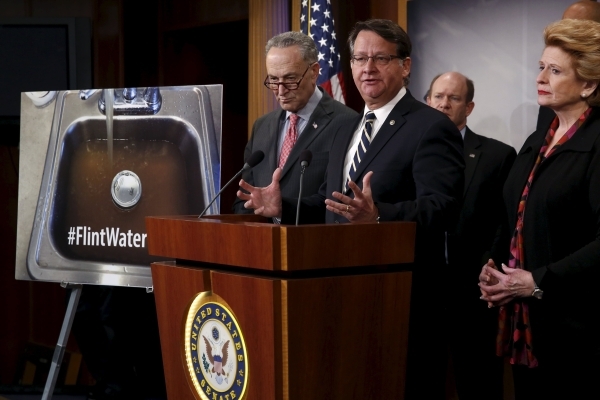Federal energy bill stalled over Flint water crisis

WASHINGTON — A broadly supported energy bill was sidelined last week in the Senate as policymakers clashed over how to address the crisis over lead-tainted municipal water found poisoning children in Flint, Mich.
Senate Democrats helped to block further action on the energy bill after their request for as much as $600 million to fix the water system in Flint was turned down by Republicans controlling the legislation. The Republicans countered with a $550 million package mostly of loans. Democrats saw that as insufficient to address the city’s immediate needs because the loans would take time to process.
A procedural motion to set up a vote on final passage of the energy bill without reaching an agreement on the Flint issue fell six votes shy of the 60 votes needed, as Democrats joined a handful of Republicans in opposition. The vote was 54-43.
Senate Majority Whip John Cornyn, R-Texas, complained that Democrats were using the Flint crisis for partisan purposes.
“We know that the vote that just went down was not about the energy bill. This was about trying to embarrass Republicans and to try to make us look bad and portray us as having no compassion for the poor people of Flint, which is exactly the opposite of true,” he said.
Senate Minority Leader Harry Reid, D-Nev., said the Michigan senators had worked hard to negotiate with Republicans but were unable to get an agreement in place.
“I would like my Republican colleagues to come to the floor and explain to this country why this manmade disaster in Flint is not worthy of Republicans’ attention. Tell us why 100,000 Americans should be forced to drink polluted water and bathe in poisonous water,” he said.
Unhealthy levels of lead have been found in the tap water across Flint as a result of the city’s switch in April 2014 to the Flint River as a water source. It had previously used water from Lake Huron that was treated in Detroit. The Flint River water proved more corrosive, causing lead to leach from city pipes into the drinking water.
“This is a public health emergency on a massive scale. It is unprecedented. I don’t know of any other American city where families in the entire city can’t drink the water, can’t cook with the water, can’t bathe with the water,” said Sen. Debbie Stabenow, D-Mich.
Senate leaders said they expect to return to the energy bill soon as negotiations over the Flint water crisis continue.
Reid voted against moving forward with the energy bill. Sen. Dean Heller, R-Nev., voted to advance the bill.
Affordable Care Act
House Republicans were unable to muster the two-thirds majority needed to override President Barack Obama’s veto of legislation that would have dismantled his signature health care law.
Although the vote came up short, Republicans said the effort demonstrated their ability to reverse the 2010 Affordable Care Act under a different administration. House Republicans have voted at least 60 times to repeal all or part of Obamacare since it was enacted but have failed — until recently — to overcome filibusters by Senate Democrats to get a bill to Obama’s desk. In January, they succeeded in that effort — drawing the veto.
“We have now forged a path that is a clear path to repealing ObamaCare without 60 votes in the Senate,” said House Speaker Paul Ryan, R-Wis. “So what we are proving today is that if we have a Republican president next year, we will repeal Obamacare and we will replace Obamacare.”
The override vote was 241-186. Only one Democrat voted to override, Rep. Collin Peterson of Minnesota. Reps. Mark Amodei, Cresent Hardy and Joe Heck, all R-Nev., voted to override. Rep. Dina Titus, D-Nev., voted against the override.
Operation Choke Point
The House approved legislation to end a controversial Justice Department program called Operation Choke Point that Republicans claimed was being used to block financing for industries out of favor with the Obama administration.
“For legally constituted businesses to have to fear that, in the dark of night, they are going to be shut down by the awesome power of the Obama administration is an outrage. All Americans should be outraged,” said House Financial Services Committee Chairman Jeb Hensarling, R-Texas.
Operation Choke Point is a federal government effort that has pressured financial institutions to terminate banking relationships with businesses that pose a “reputational” risk.
Rep. Brad Sherman, D-Calif., said he agreed that Operation Choke Point needed to be reined in, partly because he feared that the next Republican president might use that tactic to come after Planned Parenthood or environmental groups favored by Democrats.
Operation Choke Point “is an extremely powerful tool to destroy a business,” Sherman said.
Sherman and other Democrats, however, argued that the bill went far beyond Operation Choke Point, including provisions that would curb Justice Department powers to investigate banks.
Rep. Maxine Waters, D-Calif., said the bill would greatly weaken the subpoena powers in the Justice Department that serve as the “last line of defense between consumers and investors and bank fraud.”
“Central to the DOJ’s ability to investigate fraud and to build cases against financial institutions is its subpoena power, power that (this bill) singles out for unprecedented and burdensome restrictions,” she said.
The bill was approved, 250-169. Heck, Hardy and Amodei voted in favor. Titus did not vote.
— Contact Peter Urban at purban@reviewjournal.com or at 202-783-1760. Find him on Twitter: @PUrbanDC.


















